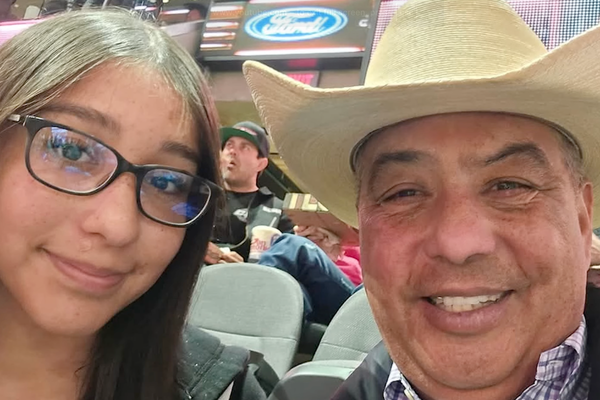
Parents and students packed the auditorium at Benito Juarez Community Academy High School Tuesday for what they thought was an assembly about activities for seniors, such as graduation requirements.
But they quickly noticed something else was afoot. TV cameras lined the back wall before students were told to take out their phones because history was about to be made.
Juarez principal Juan Carlos Ocon noted how much the pandemic interrupted the lives of the seniors, but then told the crowd: “Today, we are bringing you some good news.”
After Ocon announced elaborate plans for prom and graduation ceremonies, philanthropist Pete Kadens came to the podium for the big reveal: Each student was going to get a full scholarship to college.
Student Kimberly Lopez immediately started crying. She is at the top of her class and wants to be a mechanical engineer, but she has five brothers and sisters at home.
Her mother, a laborer, had told her she would work extra hard to put her through college, Lopez said.
“But now the burden has been lifted,” Lopez said. “Now, I think I can do this.”
The non-profit Hope Chicago is providing all 1,671 students at Juarez with a full scholarship to one of 20 Illinois colleges or training programs of their choosing.
And in an unusual twist, one of their parents also will get the opportunity to go to college or a vocational training program for free.
“So you can lift up the whole family and lift up the whole community,” said former CPS CEO Janice Jackson, who stepped down from that post last year to run Hope Chicago. The idea is to tackle intergenerational poverty by giving both students and parents a way to get better jobs.
Benjamin Arroyo said he is excited about his mom having a chance to go to college, too. She came to the U.S. from Mexico to give him a better life. “Now she gets a chance to experience this,” he said.
Hope Chicago was started with $20 million from Kadens and fellow philanthropist Ted Koenig. Jackson is working on raising $1 billion over 10 years so that eventually 24,000 students and 6,000 parents can get scholarships.
Juarez High School in Pilsen was the first of five high schools where all students and their parents are getting the news this week. Students at Al Raby High School in Garfield Park were also given the news they were eligible for the program Tuesday.
“This is life changing. This is going to transform the life of my families, my students, this is going to mean the whole world to them,” said Ocon.
Jackson said the scholarship program seeks to solve one of the problems she couldn’t fix as CEO of CPS. Under her leadership, more students graduated high school, more students went to college, but still less than half of those students completed a college degree.
Jackson said time and again students would say they returned home because they couldn’t afford to stay.
And while almost all of the students at these high schools are considered low-income and therefore likely eligible for some financial aid, Jackson said this scholarship will “close the gap” between financial aid and the full cost of attending college, including room and board, fees and other unforeseen costs.
“That’s what makes this … such a generous program, because we know that sometimes those fees, or emergencies that pop up are the reasons why many of our kids come back home from school,” she said.
At Juarez, about 81% of students graduate from high school and 55% of those who graduate immediately enroll in college. But only 44% of those who go to college get an associate’s or bachelor’s degree, according to the To&Through Project at the University of Chicago.
In addition, Ocon said some of his students are undocumented and therefore don’t qualify for financial aid. Hope Chicago will fund their college as well.
“When our undocumented students realize the enormity of this news … they will be so excited,” Ocon said.
Jackson said the schools that were chosen are places where the percentages of students enrolling in college and earning a degree are low. Those high schools will be given success coaches to support students and the partner colleges have agreed to have resources on campus for the students with Hope scholarships.
Hope Chicago is not yet revealing the 20 partner colleges and programs, but they include the University of Illinois at Urbana-Champaign and Illinois State University. Students who choose not to attend one of the partner colleges and programs will get a yearly stipend of $1,000 for extraneous expenses.
Jackson said she is working on bringing on more partner schools, focusing first on historically Black colleges and universities.
Sarah Karp covers education for WBEZ. Follow her on Twitter at @WBEZeducation and @sskedreporter.







